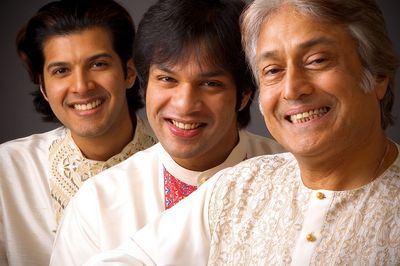Ustad Amjad Ali Khan to showcase music of the sarod at Hill Auditorium

Ustad Amjad Ali Khan, right, and his sons will showcase the music of the sarod at Hill Auditorium.
That is to say when he plays his sarod, you can almost envision sparks flying from his fingertips.
"There is no essential difference between classical and popular music,” he has said. “Music is music. I want to communicate with the listener who finds Indian classical music remote."
Khan is the world’s acknowledged master of sarod, the stringed instrument that’s the smaller counterpart to the sitar in Indian classical music. In fact, Khan is a sixth-generation master of the sarod, following his father, Haafiz Ali Khan, who was perhaps the instrument’s greatest exponent until his death 40 years ago.
Today, the son has surpassed even his own father’s considerable legacy, headlining concerts across the globe, including his University Musical Society performance at Hill Auditorium on Feb. 16.
PREVIEW
Amjad Ali Khan
- Who: Master Indian musician, with his two sons.
- What: Music of the sarod, an instrument like a smaller sitar.
- Where: Hill Auditorium, 825 N. University Ave.
- When: 8 p.m. Saturday, Feb. 16.
- How much: $10-$46, available from the Michigan League Ticket Office or ums.org.
“By 12, I was a mature performer,” he recently told journalist Kavita Chhibber. “I was also the first in my family to receive formal education-Modern school, Delhi being my alma mater.
“I was in my final year when I left to accompany a troupe of musicians to the US and never looked back”
In addition to his nearly nonstop touring, Khan is a prodigious composer, having written more than 40 ragas, which have become part of the vocabularly for contemporary Indian classical music.
“I feel embarrassed in saying I composed these ragas,” he said. “Let’s just say I discovered them.
"I would find myself humming in solitude and then suddenly realize its something new and unique and I would give it a name.”
Although he has performed with a Who’s Who of western performers, including concerts with major symphony orchestras and collaborations with singer-songwriter and Michigan native, Carrie Newcomer. However, while some of those forays have been enjoyable, they don’t provide him with a lot of artistic rewards.
“Fusion is a momentary pleasure, almost like flirtation but you cannot produce a legitimate child out of it,” he said. “Both the western and Indian traditions are so strong, character-wise, that it is impossible to mingle the two and create a third tradition out of it.”
Indeed, Khan said he’s more interested in preserving—and furthering—the traditions of Indian classical music. To that end, he’ll be performing in Ann Arbor alongside his sons, Ayaan and Amaan, marking seven generations of musicians from Khan’s family lineage.
“The greatest satisfaction is that in each young Sarod player in India, there is an Amjad Ali Khan hidden somewhere,” he said. “They may be disciples of any musician but the love that I feel emanating from them for me is amazing.
“When the three of us play together its like a living tradition alive on stage and a unique experience for people.”


Comments
BhavanaJagat
Tue, Feb 12, 2013 : 5:36 p.m.
SOUND ENERGY - THE MIRACLE CURE FOR STRESS: Delighted to read about this sarod performance by master Indian musician Ustad Amjad Ali Khan and his sons. Thanks for including the video report. This is a performance which reflects the Indian tradition of Master-Student relationship in learning and creative arts. In the Indian tradition, sound energy is the manifestation of the Divine Power in the terrestrial domain. It is no surprise to note that people all over the world have developed their own traditions of music to find solace and comfort and to enjoy their living experience.